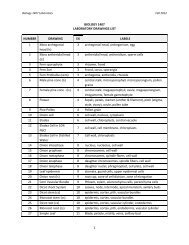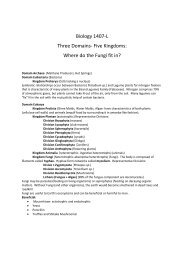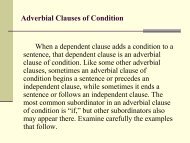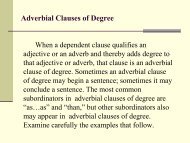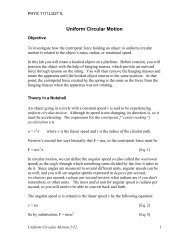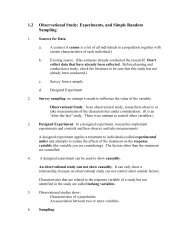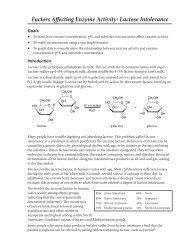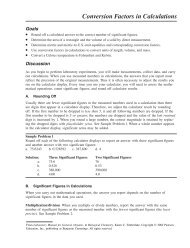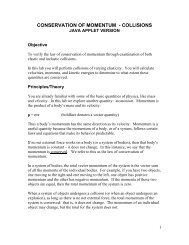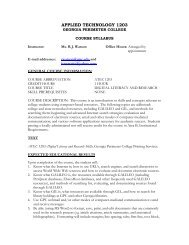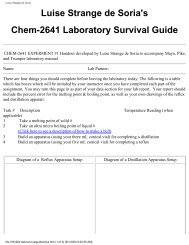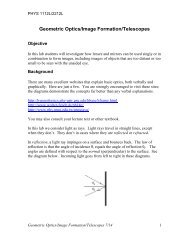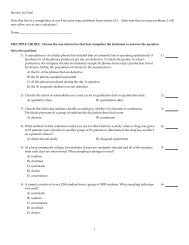SYLLABUS HONORS PSYC 1101 - Faculty & Staff, Georgia ...
SYLLABUS HONORS PSYC 1101 - Faculty & Staff, Georgia ...
SYLLABUS HONORS PSYC 1101 - Faculty & Staff, Georgia ...
You also want an ePaper? Increase the reach of your titles
YUMPU automatically turns print PDFs into web optimized ePapers that Google loves.
COURSE INFORMATION<br />
Course title:<br />
Course number: <strong>PSYC</strong> <strong>1101</strong><br />
Course description:<br />
<strong>SYLLABUS</strong><br />
<strong>HONORS</strong> <strong>PSYC</strong> <strong>1101</strong> - ONLINE VERSION<br />
PLEASE PRINT THIS OUT<br />
Honors Introduction to General Psychology<br />
Welcome to Honors Principles of Psychology. This course provides an overview of the major<br />
areas in the field of psychology. As a survey course, we will cover a variety of areas within<br />
the field. The course covers major topics in psychology including, but not limited to major<br />
theoretical perspectives, research methodology, biological and social factors influencing<br />
behavior, development, learning, memory, personality, and abnormal psychology. Upon<br />
completion of this course, students should be able to understand theories, terminology,<br />
principles, processes and methods in all of the above areas. The general objective of this<br />
course is to provide you with an overview of the field, to assist you in recognizing how<br />
psychology can be applied in your life, and to develop your critical thinking skills. As an<br />
honors course we will emphasize critical thinking, analysis, and application of the above<br />
topics.<br />
INSTRUCTOR INFORMATION<br />
Name and email:<br />
Tina Stern, Ph.D.<br />
PLEASE COMMUNICATE WITH ME THROUGH iCollege e-mail; My College e-mail is<br />
tina.stern@gpc.edu – PLEASE ONLY USE THIS FOR EMERGENCIES (e.g. if you cannot<br />
access iCollege). I try to respond to email messages that I receive Monday through Friday<br />
within 24 hours. If you must contact me on the GPC e-mail, please be sure to put “online<br />
section #___” in the subject line.<br />
Webpage:<br />
http:/facstaff.gpc.edu/~tstern<br />
Office location: Dunwoody Campus, Building E, Room 2216<br />
Please see the Daily Course Schedule for my office hours this semester. If you are making<br />
Office hours:<br />
a special trip to campus to see me, please confirm that I will be holding office hours that<br />
day as occasionally I must attend meetings that occur during office hours<br />
(770) 274-5426 I try to respond to phone messages that I receive during the week within<br />
Phone:<br />
24 hours.<br />
REQUIRED TEXT AND SUPPLEMENT<br />
1. Experience Psychology, 2 nd edition, 2013, by Laura King –ONLY this text can be used for this course<br />
2. Connect – publisher’s online study system; this requires an access code. This is required; 20% of your grade is based<br />
on performance on Connect activities.<br />
3. Purchasing options for the text book and Connect:<br />
a. GPC bookstore<br />
i. The GPC bookstore has as a special reduced rate package of a loose-leaf copy of the text packaged<br />
with the Connect-plus access code. This package is only available through GPC bookstores. At a GPC<br />
bookstore, the ISBN number for the GPC package is 9781259112072.<br />
b. Text from sources other than GPC online bookstore – the loose leaf version is not available elsewhere<br />
i. The bound soft-cover text book - ISBN # is 9780078035340 (this does not include a Connect access<br />
code).<br />
ii. IF YOUR BOOK DOES NOT COME WITH A CONNECT PASSCODE THEN YOU MUST BUY CONNECT<br />
SEPARATELY! IMPORTANT INFORMATION ABOUT GETTING CONNECT IS BELOW
1. If you are buying Connect separately, there are 2 versions of Connect. Connect Plus<br />
costs almost what a text book costs and that is because it contains the ebook of the<br />
text. If you already have the text book, then you only need to buy Connect (NOT<br />
Connect Plus).<br />
2. You can buy a Connect passcode online and get an access code for Connect immediately<br />
3. You can also get a 21 day free trial period of the text AND Connect immediately<br />
4. To purchase the passcode online or to begin the 21 day free trial follow these steps:<br />
a. Go to the student sign in page: http://connect.customer.mcgrawhill.com/student-start<br />
b. Once there, you will be provided with three user options:<br />
i. 1) Sign In (register with code)<br />
ii. 2) Purchase Access (buy code online – with or without ebook option is<br />
available)<br />
iii. 3) Start Free Trial (instant access to course work and material for a FREE<br />
21 day trial)<br />
REMEMBER THAT EVEN IF YOU CAN’T GET YOUR TEXT AT THE VERY BEGINNING OF THE SEMESTER, THERE IS A 21-DAY<br />
FREE TRIAL OF THE TEXT AND OF CONNECT!!!<br />
Therefore there is no reason that you cannot begin reading and completing Connect assignments immediately!!<br />
Please be sure to have your text book by the second week of classes<br />
COURSE REQUIREMENTS<br />
1. READING ASSIGNMENTS<br />
We will be reading nine, non-consecutive chapters in your textbook. Please note we are covering chapters 1, 2, 5,<br />
6, 8, 9, 10, 11, 12, so be sure not to go automatically from chapter 2 to chapter 3 since we are not covering all the<br />
chapters in the book. Under the Learning Modules folder you will find a link for the chapters we are studying. For each<br />
chapter you will find the following tools to assist you in your understanding of the material:<br />
• Chapter Introduction<br />
• Chapter Learning Objectives/Study Guides<br />
• Detailed Power Point Presentations<br />
Specific reading assignments and their due dates are in the Weekly Course Schedule which you can find on the course<br />
homepage. Please expect to read all material more than once.<br />
2. CLASS DISCUSSIONS – 10% of grade<br />
• You are required to complete 10 discussions during the 16-week semester. This means that there are several weeks<br />
during which you have no discussion assignment (but you will have another assignment described below). Please<br />
see the Weekly Course Schedule to see the due dates and times. Postings that come in after the deadline get no<br />
credit. Weekly online discussions constitute 10% of your course grade.<br />
Procedures for participation in discussions:<br />
• Discussion topics are on the Discussion Board (click on Discussion on the Course Toolbar left side of the<br />
screen). You have the potential to earn an extra credit point IF you REGULARLY make multiple postings and/or<br />
responses to other students that contain SUBSTANTIAL CONTENT.<br />
• Grading of class participation in discussions – please read carefully:<br />
• Discussion postings are worth 1 point each, for a total of 10 points. Your discussion grade for each week<br />
will be added to the total. If your discussions do not meet all the following criteria you will get partial<br />
credit<br />
• To receive full credit, discussion postings MUST:<br />
• cite information from the textbook that you put INTO YOUR OWN WORDS<br />
• relate information from the textbook to the discussion topic<br />
• reflect effort, thought and time<br />
• show that you understand the reading
• apply the content you have read to the discussion and to “real life”<br />
• go beyond your opinion; while your opinion is welcome, it is NOT enough to get a passing<br />
grade<br />
• answer ALL parts of the question with specific (vs. general) information<br />
• NOT just copy information from the book or from other students’ postings!! You MUST put it<br />
in your own words to demonstrate your understanding. USING INFORMATION VERBATIM<br />
FROM ANY OTHER SOURCE (TEXTBOOK, ONLINE SOURCE, OTHER STUDENTS’ POSTINGS) IS<br />
PLAGIARISM AND CAN CAUSE SERIOUS PROBLEMS IN THIS COURSE. Material from the text<br />
must be referenced in APA style.<br />
• A failing message:<br />
o is brief, incomplete or overly general – it lacks complete and specific information<br />
o contains only your opinion or inadequate information from the text book<br />
o answers only part of the question or one of the questions that I ask<br />
o gives a generic or common sense answer that doesn't demonstrate that you've read the book<br />
o is inaccurate<br />
o does not reflect effort - it looks like something you wrote in two seconds<br />
o comes in after the deadline<br />
o uses inappropriate in language, tone, or content<br />
o is not in your own words...takes the text verbiage verbatim or other students' words<br />
GROUND RULES FOR USE OF ALL COMMUNICATION TOOLS:<br />
Acceptable use of ALL communication tools Unacceptable use of ALL communication tools<br />
1. Disagreeing respectfully<br />
1. Making any response that you would not make to the<br />
2. Responding to discussion threads<br />
person directly<br />
3. Initiating course related discussion threads 2. Making personal attacks or slurs<br />
4. Discussing material in the textbook<br />
3. Making attacks based on a person’s race, ethnicity,<br />
5. Discussing how any course-related material religion, disability, sex, or sexual orientation<br />
applies to you and to your life<br />
4. Sending links that are unrelated to course material<br />
6. Asking any questions related to the course 5. Sending inappropriate (sexual, illegal, threats)<br />
material<br />
information, links, or comments<br />
6. Sending harassing or threatening information or<br />
comments<br />
The instructor reserves the right to delete any posting that violates any of the above rules or is inappropriate for<br />
this course.<br />
3. CONNECT/LEARN SMART QUIZZES – 15% of grade<br />
o You are required to complete a quiz using Connect Learn Smart for each chapter. The text book publisher<br />
has a wonderful online study program called Connect Learn Smart. You will need a pass code to use<br />
Connect which comes with the GPC bookstore version of the text or can be purchased separately (see<br />
above). For each chapter you are required to take a quiz available through this software. The quizzes will be<br />
personalized; that is, the questions you will be asked will be based on the questions that you miss and get<br />
right. In other words, the quiz will be geared to help you address the things you do not understand. You<br />
should keep answering the questions until you get them all right. The goal is for you to get all questions<br />
correct. The only way to get full credit is to answer all questions correctly regardless of how many attempts<br />
it takes to do this. If you stop testing before you get all questions correct then you will get whatever score<br />
you have when you choose to stop testing.<br />
o Please see the Weekly Course Schedule for the due dates of the nine quizzes and post these dates in your<br />
personal calendar. Please see the home page which will give you directions for getting access to and using<br />
CONNECT. Like the discussion postings, the quizzes are due by 11:00 p.m. on Sunday evenings. I will not<br />
accept late quizzes. Nine quizzes, one for each chapter, are required. You should allow one to two hours for<br />
each quiz. Scores on Connect quizzes are worth 15% of your grade.<br />
o Additional information on about Connect/Learn Smart Quizzes is on the iCollege home page
o The BEST way to use these quizzes is to study the material and then take the quiz. These will function as<br />
practice tests and alert you to what you do not yet understand fully. Do not take the quiz before you have<br />
studied.<br />
4. EXAMS – There are 3 exams and a comprehensive final<br />
1. Chapter Exams: 30% of grade<br />
a. There are three exams and each exam will cover 3 chapters.<br />
b. All exams are timed, open book/open note, exams and are administered online.<br />
c. Each exam will require one essay from each chapter the test is covering and 25 multiple-choice<br />
questions (with about the same number from each chapter) so it will be important to pace<br />
yourself and use your time efficiently.<br />
d. Students will have 75 minutes to complete the tests within a 24-hour window. PLEASE CHECK THE<br />
WEEKLY COURSE SCHEDULE FOR THE DATE AND TIME OF YOUR FINAL EXAM.<br />
e. A set of Learning Objectives for each chapter is provided. The Learning Objectives are also study<br />
guides for the exam.<br />
f. Only your two highest scores on Exams 1-3 will count toward your grade. The lowest score from<br />
these exams will be dropped before your final grade is calculated. The lowest test grade is<br />
dropped to allow for student emergencies, so please save it for emergencies.<br />
g. I do not give make-up exams; instead I allow you to drop your lowest exam grade. Each exam is<br />
worth 15% of your final grade. Combined, the two highest exam grades account for 30% of your<br />
grade<br />
2. Final Exam: 15% of grade<br />
a. The final will cover the Learning Objectives from all 9 chapters.<br />
b. The comprehensive final requires students to write five essays and answer 50 multiple choice<br />
questions.<br />
c. You will have two hours to complete the final exam within a 24-hour window….PLEASE CHECK THE<br />
WEEKLY COURSE SCHEDULE FOR THE DATE AND TIME OF YOUR FINAL EXAM.<br />
d. All exams are timed, open book/open note, exams and are administered online.<br />
e. The final exam counts for 15% of your grade. You may not select the final as your dropped test<br />
grade. All students must take the final exam.<br />
f. You will receive a study guide for the final exam.<br />
3. All exams are available for a 24-hour period. Check the Daily Course Schedule for the dates and times.<br />
4. All exams and the final can be accessed by clicking the Exams icon on the homepage or the Assessments link<br />
on the course toolbar at the top of the screen. Be sure to have computer back up in case you run into a<br />
problem with your computer.<br />
5. Make Up Exams: There will be NO make-ups for an exam. Exams will be scheduled so that you have a 24<br />
hour window in which to take them and thus, you should be able to adjust your schedule accordingly. You<br />
will be expected to take your exams when they are scheduled even if you are out of town so be sure if you<br />
are traveling during an exam period that you have internet access. Your lowest exam grade will be dropped,<br />
so if you must miss an exam you may use that as your dropped grade. All students are required to take the<br />
final exam. You may not drop your final. Rescheduling the final exam will be done only in the case of a<br />
true, documented emergency as determined by the professor.<br />
4. WRITING ASSIGNMENTS – 30% of grade<br />
Two writing assignments are required. Detailed instructions for the assignments and specific information on how they will<br />
be graded can be found in the Essays Organizer folder which will appear on the iCollege Course Home Page (AFTER you have<br />
passed the Orientation Quiz) AND on the Assignments Section. The Correlation Writing Assignment counts for 15% of your<br />
course grade and the Abnormal Psychology Writing Assignment is worth 15% of your grade. The due dates for the<br />
assignments can be found on the Course Schedule. Writing assignments are due in the assignment tool AND to TURNITIN<br />
no later than the posted due date and time and will not be accepted after that deadline.<br />
GRADING POLICY<br />
Grades are determined objectively by a point system. I encourage you to keep track of your grade point average throughout<br />
the quarter. Point percentages are converted to letter grades as follows:
3 tests 30% 90-100 A<br />
final 15% 80-89 B<br />
discussions 10% 70-79 C<br />
Connect quizzes 15% 60-69 D<br />
Correlation Writing Assignment 15% below 69 F<br />
Abnormal Psychology Writing Assignment 15%<br />
TOTAL 100%<br />
COMMUNICATIONS<br />
It is essential that you check your iCollege email and home page<br />
3 times a week at a minimum!<br />
Otherwise you may miss out on information and important announcement. As an online class, communications between<br />
students and between students and professor will be structured in the following ways.<br />
Discussion Board: All class discussions occur via the Discussion Board which is accessed from the Course Toolbar on the left<br />
side of the home page. Any message posted on any of the Discussion topics can be read by all members of the class, so be<br />
sure that you are comfortable with any member of the class reading anything that you post on the Discussion Board. I<br />
expect that any communication placed on the Discussion Board will be appropriate in terms of content, language,<br />
professionalism, and respectfulness. I encourage debate and disagreement, but expect that you will do so with respect.<br />
iCollege E-mail: iCollege provides an internal e-mail service that can be used by all members of the class to e-mail each other<br />
and me. All e-mails are private communications – only the sender and receiver can read them. I will use ONLY iCollege e-<br />
mail for communications between myself and students in this class. I will use iCollege e-mail to communicate to you and<br />
require you to use it to communicate with me. I will be using the GPC email for communication with class<br />
members. Therefore, be sure to check your iCollege e-mail on a regular basis (3-4 times per week). This is essential to<br />
success in this course. I will provide a response to emails that I receive from students during the week within 24 hours<br />
during the week. iCollege e-mail is accessed from the Course Toolbar. Remember, it is unacceptable to allow access to your<br />
iCollege account to anyone else. No one else my use the email or any other iCollege feature.<br />
Announcements: There is an Announcements tool that you can access from the Course Tool bar that I will use to post<br />
important information. Be sure to check the Announcements on a regular basis. Announcements will also “pop-up” from<br />
time to time when you log onto the course. Please read them before you delete them!<br />
Technology Requirements: You and your computer must be able to use iCollege and the Internet. If either you or your<br />
computer does not have this capacity, I encourage you to take a traditional course taught in the classroom. There is<br />
technology support provided by GPC at the online support center link found at http://www.gpc.edu/iCollege. Please direct<br />
your technology questions there. Also, please remember that technology problems are not acceptable as reasons for<br />
missed work or deadlines. Because unanticipated technology problems can arise, be sure to have a back up plan that may<br />
include access to alternate computer sites. Unanticipated technology problems also make it essential that you do NOT<br />
wait until the last minute to complete and submit discussion postings and assignments. Also be sure to allow enough time<br />
to complete tests and submit discussions and essays. Do not cut it so close that the computer may time you out before you<br />
are finished.<br />
EXPECTED EDUCATIONAL RESULTS<br />
As a result of completing this course the student will be able to:<br />
1. Explain the differences and similarities between the psychodynamic, behavioral, cognitive, humanistic, sociocultural,<br />
and biological perspectives as well as the current perspective on the relative influences of heredity and environment on<br />
human behavior.<br />
2. Describe, compare and provide examples for each of the major research methods used in psychology, including<br />
strengths, limitations, and key terminology associated with each, including how descriptive statistics are used to<br />
analyze data.
3. Identify ethical issues in psychology.<br />
4. Describe in detail the functioning of the nervous system, including the divisions of the nervous system and their<br />
functions, the major structures of the brain and their functions, the types and parts of the neuron, the process of<br />
neurotransmission, the role and functions of the major neurotransmitters.<br />
5. Define learning and describe, identify, compare and contrast the major features and principles of operant<br />
conditioning, classical conditioning, and social learning.<br />
6. Describe the major theories of memory, including factors that contribute to the retention, retrieval, and forgetting of<br />
information.<br />
7. Describe social psychological findings regarding: conformity, obedience, diffusion of responsibility, groupthink, social<br />
loafing, prejudice, stereotyping, and discrimination.<br />
8. Describe relevant theories and research on prenatal development, temperament, and early childhood development<br />
and compare, contrast, and evaluate the viewpoints of major developmental theorists including the following:<br />
• Freud - psychosexual theory<br />
• Erikson - psychosocial theory<br />
• Harlow & Ainsworth - attachment theory<br />
• Piaget - cognitive theory<br />
• Kohlberg & Gilligan - moral reasoning<br />
9. Outline the basic principles of psychoanalytic, humanistic, cognitive-behavioral, biological and trait theories of<br />
personality. Compare and contrast these theories.<br />
10. Identify major objective and projective personality tests and evaluate them based on the characteristics of a good<br />
psychological test in terms of reliability, validity, standardization, and norms.<br />
11. Compare and contrast various criteria that can be used to identify a person's behavior as "abnormal." Describe the<br />
current classification system and its strengths and weaknesses.<br />
12. Compare and contrast the major theories on the etiology of psychological disorders, including psychoanalytic,<br />
behavioral, cognitive, humanistic, biological, and sociocultural.<br />
13. List the major characteristics of 1) anxiety disorders, 2) mood disorders, 3) dissociative disorders, and 4)<br />
schizophrenic disorders. Identify the specific disorders that are grouped in each class.<br />
14. Meet instructor-developed learning objectives related to additional topic areas covered by the instructor.<br />
GENERAL EDUCATION OUTCOMES<br />
I. This course addresses the general education outcome relating to communications as follows:<br />
A. Students develop their reading comprehension skills by reading the textbook, handouts, and assigned journal<br />
articles.<br />
B. Students develop their listening skills by listening to lectures, videotapes, and other students (during group<br />
discussions and problem-solving exercises).<br />
C. Students develop their writing skills through written homework assignments, papers, and/or writing essays as<br />
part of exams.<br />
D. Students develop their speaking skills by asking questions, through class discussions, and/or through oral reports<br />
to the class.<br />
II. This course addresses the general educational outcome of demonstration of effective problem-solving and critical<br />
thinking skills by requiring students to apply knowledge gained from the course to analyzing and solving the types of<br />
problems that are often encountered in real life.<br />
III. This course addresses the general education outcome of understanding, interpreting, and communicating<br />
quantitative data by requiring students to use basic descriptive statistics to summarize and analyze data and to<br />
define and interpret key terms used in descriptive statistics.<br />
IV. This course addresses the general education outcomes of recognition and application of scientific inquiry by<br />
requiring students to explain the differences between experimental and descriptive research, to identify examples<br />
of each, and to identify and describe each of the major research methods used in psychology, including strengths,<br />
limitations, and key terminology associated with each.<br />
POLICIES - The following policies apply to ALL Social Sciences courses offered at <strong>Georgia</strong> Perimeter College.<br />
1. WITHDRAWAL POLICY: Except in the case of “no shows,” the instructor WILL NOT withdraw you from this course.<br />
(A “no show” is a student who never attends class or logs in to an online class during the first week or two of the<br />
course. When students are reported as no-shows, the course is removed from their records, and any financial aid<br />
awarded on the basis of that course is returned to the lender or grantor. If you have logged on to an online course,
you will not be reported as a no show.) If you decide that you do not wish to continue in this course, it is your<br />
responsibility to withdraw yourself prior to the midpoint of the semester. (Exact dates for each term are posted on<br />
the GPC website under “Academic Calendar.”) Withdrawal is a formal process that requires you to fill out a<br />
withdrawal form and submit it to the registrar on one of our campuses. If you have Financial Aid, you may be<br />
required to repay all or part of the Financial Aid awarded to you. Therefore, a Financial Aid advisor must sign off on<br />
the withdrawal form. When you submit the form to the registrar, he or she will stamp the form with the date<br />
received and give one copy to you. You should KEEP this form in case there are ever questions as to whether you<br />
properly withdrew yourself from the course.<br />
If you are unable to come to one of our campuses to fill out and submit a withdrawal form, you may print one<br />
from online: http://www.gpc.edu/forms/withdrawal.pdf. Note that there is a second page with detailed<br />
information about the withdrawal process. If you are unable to submit your form in person, please contact the GPC<br />
Online office at 678-891-2805 for assistance in submitting your form. No matter how your form is submitted, it is<br />
your responsibility to ensure that it is received by <strong>Georgia</strong> Perimeter College no later than 5:00 p.m. on the day of<br />
the withdrawal deadline.<br />
2. AMERICANS WITH DISABILITIES ACT STATEMENT: If you are a student who is disabled as defined under the<br />
Americans with Disabilities Act and requires assistance or support services, please seek assistance through the<br />
Center for Disability Services. A CDS Counselor will coordinate those services.<br />
3. ACADEMIC HONESTY STATEMENT: Cheating is against college policy. Cheating includes any attempt to defraud,<br />
deceive, or mislead the instructor in arriving at an honest grade assessment, and may include copying answers from<br />
other students or using unauthorized notes during tests. Plagiarism is a particular form of cheating that involves<br />
presenting as one's own the ideas or work of another, and may include using other people's ideas without proper<br />
attribution and submitting another person's work as one's own. Violations of the academic honesty policy will result<br />
in a grade of '0' for the assignment in question, and may result in a failing grade for the course at the instructor's<br />
discretion. The College Court may impose additional sanctions, including suspension, expulsion, or dismissal from<br />
the college. Students have the right to appeal a grade awarded on the basis of alleged cheating or plagiarism. See<br />
the Academic Honesty Policy in the Student Handbook for details and for a review of the appeals procedure.<br />
4. STATEMENT OF NON-DISCRIMINATION: No person shall, on the basis of age, race, religion, color, gender, sexual<br />
orientation, national origin or disability, be excluded from participation in, or be denied the benefits of, or be<br />
subjected to discrimination under any program or activity of the college.:<br />
5. AFFIRMATIVE ACTION STATEMENT: <strong>Georgia</strong> Perimeter College adheres to affirmative action policies to promote<br />
diversity and equal opportunity for all faculty and students.



